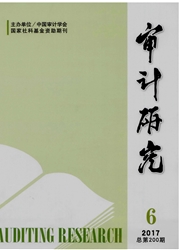

 中文摘要:
中文摘要:
为了与国际会计准则趋同,我国2006年颁布的《企业会计准则》取消了对商誉进行摊销的做法,改为至少在每年年末进行减值测试。商誉减值测试是一种不可核实的估计,探索实施这种强行规定时是否由于不可核实的估计需要更多的工作量以及带来审计风险使得审计费用上升具有现实意义。我们以2007--2014年度A股上市公司为样本,实证分析商誉减值测试的不可核实性是否会导致审计费用的上升。实证结果显示,相对于没有商誉的公司,有商誉的公司审计费用明显上升,并且在那些确实计提了不可核实的商誉减值估计损失公司中,其审计费用增加的更多。另外还发现公司治理在不可核实的商誉减值测试估计中影响审计费用。
 英文摘要:
英文摘要:
In order to converge with International Financial Reporting Standards, Chinese Accounting Standard for Business Enterprises issued in 2006 prohibits the approach of goodwill amortization. Instead, enterprises are required to carry out a goodwill impairment test at least once each year. The goodwill impairment test is an unverifiable estimate. This paper aims to figure out whether the new standard is of practical significance, as audit fees may increase with additional work and audit risks may grow. We sampled financial statements of A-share listed companies from 2007 to 2014 to see whether unverifiable estimates presented in the goodwill impairment test resulted in a rise of au- dit fees. The empirical results show that audit fees increased significantly if companies owned goodwill. We also find a positive correlation between goodwill impairment loss recognition and audit fees. Further, evidences present that corporate governance influences audit fees ,when unverifiable estimates test in goodwill impairment.
 同期刊论文项目
同期刊论文项目
 同项目期刊论文
同项目期刊论文
 期刊信息
期刊信息
